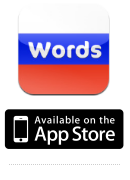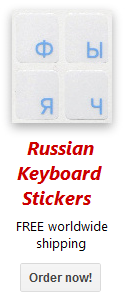| FR | About us | Home | User agreement | Link to us |
Try Not to Trip Up on These 10 English and Russian Words
Speak English? Speak Russian? Speak both? Every language comes with its tricky words and phrases that will stumble you up or will make native speakers giggle among themselves, but if you know the tricks of the trade, you can stand ahead of the vocab curve. With this in mind, today we're going to explore ten common and not-so-common English and Russian words that might catch you out if you're not careful. Let's get straight into it.
1. “Chef - шеф”
Similar to the English word, or shef in Russian, is kind of similar to the English version of the word, although it can be applied more universally. While chefs tend to stay in the kitchen, shef means 'boss,' which could be of anything, such as a business or company.
2. “Conductor - кондуктор”
If you're speaking to a Russian konduktor, you'll be on a bus buying a ticket for your journey ahead. In English, you've already taken the bus and will be more likely sat in a theatre or opera house watching the person lead their orchestra.
3. “Fabric - фабрика”
In English, you're either in the infamous London nightclub dancing the night away or, most commonly, referring to a material in which clothes and curtains are made out of. In Russia, (fabrika), you'd be in a production factory. I think we all know which one would be the most fun.
4. “Physique - физик”
The English term 'physique' normally means you are talking about someone's physical appearance, or their bodies, perhaps in a fitness environment. In Russian, the similar term fizik is refined to the lab carrying out their research as a physicist. You could use both words together when judging how much exercise the scientist gets. See word number nine if you want to make things even more complicated!
5. “Prospect - проспект”
While dreaming of your potential prospects as an English man or woman, or perhaps someone who's going to pass a university course or get a job in a company, the chances are you won't be talking about Russian buildings (prospekt). It can also refer to 'the draft of a project.'
6. “Family - фамилия”
These two words, which are very close now, the English of which obviously refers to the group of people you consider the closest people you love, typically blood-related, where the Russian version, familia, refers to just the last part of your name. Directly translated into English, your surname.
7. “Artist - артист”
Both words refer to creative people, the English of which defines the creative types who use brushes or paint, whereas the Russian (artisty) only refers to the on-stage types of actors and singers. Of course, for many, the words can merge meanings, but if you want to refer to paint-type artists in Russian, you say 'khudozhniki.' Easy, right
8. “Accurate - аккуратный”
English = hit something precisely where you meant to hit it. Russian = a room or space which is clean and tidy. So, unless you're hitting dust mites with the end of your vacuum cleaner, use 'akkuratny.'
9. “Complexion - комплекция”
Not as 'complex' as it may first sound, in English you'd be referring to someone's face and the way their face is constructed, whereas in Russian it links back to a direct translation of physique (komplektsia), which means their body. Okay, maybe this is getting complex!
10. “Decade - декада.”
While both the English and Russia version of this word refers to timespans with ten in their name, one is slightly longer than the other. Okay, a lot longer. In English, a decade is, of course, the span of ten years, whereas in Russia, a dekada is only ten days. When you start adding other terms in like leap years and fortnights, that's when things start to get really confusing.
Conclusion
While English and Russian are very different languages, you'll have to agree that they do have many words that are very similar, especially when said aloud. Not so much when you write them down.
Molly Crockett writes for Ukwritings and Academized, where she writes about her learning languages and shares tips for making the most of your experiences in a foreign country. She also teaches writing skills for Essayroo.
Got questions?
Ask them in the Russian Questions and Answers — a place for students, teachers and native Russian speakers to discuss Russian grammar, vocabulary, pronunciation, and other aspects of the Russian language.
Copyright 2001-2026 MasterRussian.com | Privacy Policy | Contact Us
 Russian Lessons
Russian Lessons
- Russian alphabet
- Names of letters
- Russian Q&A new
- Pronunciation: Cons.
- Pronunciation: Vowels
- Noun Gender/Number
- Cases of Nouns
- Russian Greetings
- Personal Pronouns
- Learning Russian
- 1000 Common Words
- 500 Russian Verbs
- Top Russian Nouns
- » All lessons
- » Guest lessons
 Browse Topics
Browse Topics
- Start learning Russian
- Forum
- Bookstore
- Dictionaries
- Russian - basic
- Russian - adv
- Pronunciation
- Russian Blog new
- Reading
- Test & quizzes
- Translation
- Verbs
- Verb Conjugations
- Russian numbers
- Russian Tests new
- Vocabulary
- Writing
- Folk music
- Fun stuff
- Leo Tolstoy
- Learner's lore
- Literature
- Personal blogs
- Picture Dictionary new
- Proverbs
- Publications
- Radio & TV
- Russian culture
- Schools in Russia
- Russian Words
- Russian names
- Software
- Russian Words iPhone

Search MasterRussian

English » Russian dictionary

WORD OF THE DAY
![]() RSS
|
iGoogle
|
My Yahoo!
RSS
|
iGoogle
|
My Yahoo!
Meaning: war, warfare
Pronunciation: [vigh-NAH]
Learn Russian words more... »
TODAY'S STREET SIGN

Russian: Свежее пиво в кегах
English: Fresh beer in kegs
FOLLOW US ON TWITTER

MasterRussian on Twitter


